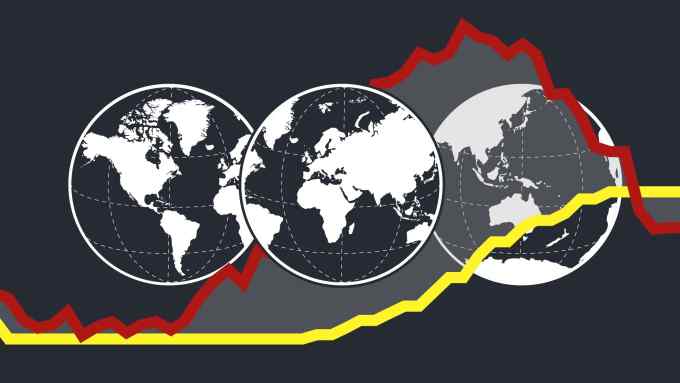Incomes stagnate for all but the richest in the UK

Simply sign up to the Visual and data journalism myFT Digest -- delivered directly to your inbox.
Only the richest 5 per cent of the UK population can expect to experience a real-terms increase in household income over the course of this parliament, according to think-tank the Resolution Foundation.
Incomes for the top 5 per cent of non-pensioner households are forecast to increase 4 per cent between 2019 and 2024 when the effects of inflation are taken into account, while the second poorest 5 per cent are forecast to experience a 1 per cent decline in real terms.
By the next election, the average working household’s real income is forecast to be 2 per cent lower than it was in 2019 — the worst performance over the course of a parliament since records began in 1960.
Amy Borrett
Our other charts of the week . . .
According to the International Longevity Centre’s Healthy Ageing and Prevention Index, the EU has the shortest “work span” — the average number of years that the population aged 15 to 65 are economically active — of all major blocs of countries.
This is partly because a high proportion of EU citizens are in education or training for much of their teens and early twenties. Early retirement, care responsibilities, and illness or disability further reduce EU work spans across older demographics.
As a result, the EU’s average work span is shorter than the African Union’s, where many countries are disadvantaged by under-developed labour markets and health systems.
Within the EU, some of the lowest work spans include Italy (24.9 years) and France (27.5 years). At the opposite end of the scale, the south-east Asian nations of Cambodia (43.7 years) and Laos (39.4 years) can expect the longest work spans.
Ella Hollowood

Fewer Twitter users in the US think the platform is bad for American democracy than they did two years ago.
In 2021 three in five Republican and Republican-leaning users of the social media site felt that Twitter was mostly bad for American democracy, but by March this year, that had dropped to just one in five, according to a survey conducted by the Pew Research Center.
Opinion among Democrats and Democrat-leaning users has gone in the opposite direction. The percentage of these users who say it is good for US democracy has fallen from 47 per cent to 24 per cent over the past two years, during which time Elon Musk acquired the company for $44bn and reinstated former president Donald Trump’s account.
Steven Bernard
More than a third of European adults aged 18 to 34 lived in their parents’ home in 2021, according to data analysed by the Pew Research Centre.
In every country covered by the analysis, young men were more likely than women to be living with their parents. The share for men is as high as 84 per cent in Croatia, 80 per cent in Greece and 74 per cent in Italy.
The gender gap was widest in Bulgaria, where 72 per cent of young men and 48 per cent of young women lived in their parents’ home.
At the other end of the spectrum, Scandinavian countries had the smallest share of young adults sharing a home with their parents. In Sweden, only 17.3 per cent in this age group are not living independently.
Federica Cocco

US president Joe Biden has announced his campaign for re-election in 2024, raising the prospect of a rerun against his 2020 adversary Donald Trump.
A rematch is a relatively rare occurrence — the same two candidates have only faced off in successive elections in six of the 59 presidential races in the nation’s history. Of those, the original winner was beaten four years later in the first four contests.
However, in the last two rematches — William McKinley vs William Jennings Bryan in 1900 and Dwight D. Eisenhower vs Adlai Stevenson II in 1956 — the original victors not only won again, but increased their margin of victory.
Alan Smith
Welcome to Datawatch — regular readers of the print edition of the Financial Times might recognise it from its weekday home on the front page.
Do you have thoughts on any of the charts featured this week — or any other data that has caught your eye in the past seven days? Let us know in the comments.
Keep up to date with the latest visual and data journalism from the Financial Times:
Data Points. The weekly column from the FT’s chief data reporter John Burn-Murdoch.
Climate Graphic of the Week is published every week on our Climate Capital hub page.
Sign up to The Climate Graphic: Explained newsletter, free for FT subscribers. Sent out every Sunday, a behind-the-scenes look at the most topical climate data of the week from our specialist climate reporting and data visualisation team.
Follow the Financial Times on Instagram for charts and visuals from significant stories.
Follow FT Data on Twitter for news graphics and data-driven stories from across the FT.








Comments